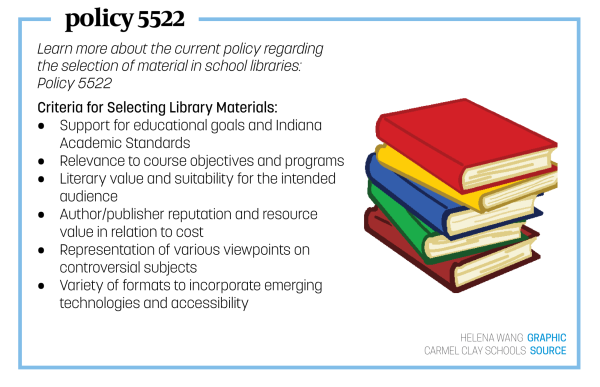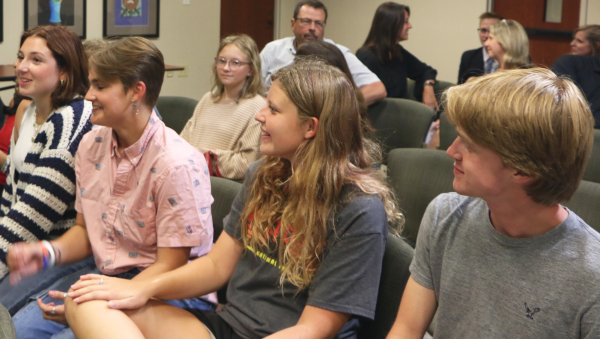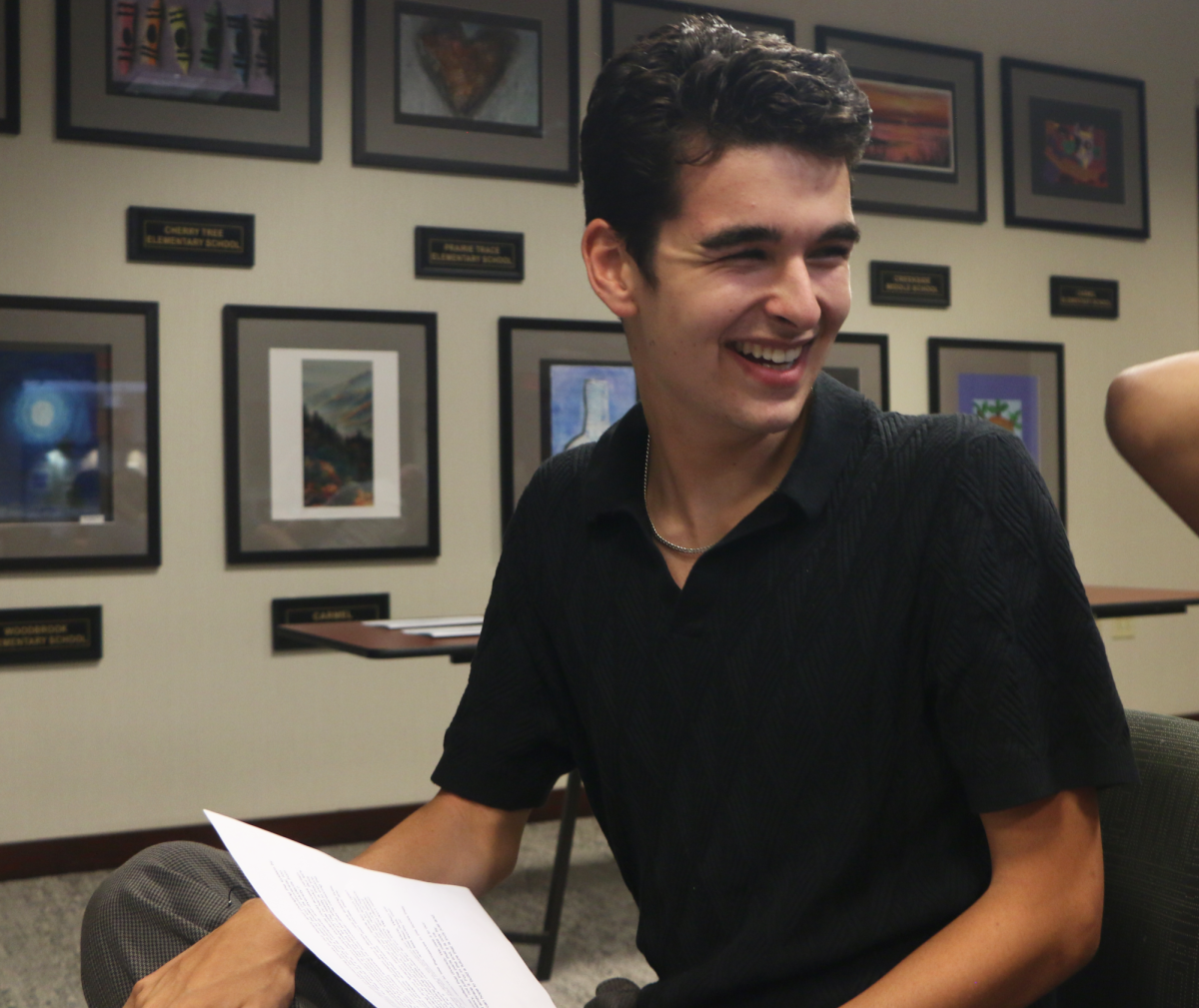On Aug. 26, multiple students from this school attended a school board meeting with the purpose of addressing their concerns about recent conversation regarding book censorship in this district. School board member Greg Brown recently suggested requiring parental permission before students could access certain books that are considered inappropriate or harmful to minors.
At the Aug. 12 school board meeting, Brown said, “The way that policy (5522) is written now could cause us to remove books. I’m suggesting a policy that states we don’t remove the book, but we put it in a different zone of sorts where both sides are satisfied with how it works.”
The board has not made a final decision and they will very likely allow board policy 5522 to remain as it is. The majority of school board members, parents of children who attend this school, and students themselves are in favor of this outcome. Policy 5522 details the basis of which material is selected in school libraries. The policy states, “A parent or guardian of a student enrolled in the Corporation or a community member who resides within the geographic boundaries of the Corporation may submit a request to remove material from a school library on the grounds that the material is obscene or harmful to minors as those terms are defined by the Indiana criminal code.”
It is important to note that those advocating for more constrictive policy often define “obscene or harmful” in a way that tends to envelop more material. Certain books that contain sexually graphic and/or LGBTQ+ material are commonly under controversy.
Media specialist Terri Ramos said, “There are multiple points that need to be met in order for something to be deemed obscene (as defined by Indiana criminal code). One of those points is that the entire work must be these things, a sexual act or whatever it is that someone is upset about, you have to look at every page. It’s a complicated situation, but at the same time not really complicated if people are educated about all of those parts. But what happens is people just hear these little bits and then they run with that. I think a lot of it is social media and fear-mongering. When social media gets a hold of something, all you hear is one or two sentences and you think that’s true, people get the wrong idea.”

Seniors Ally Swearingon and Cole Dangler both spoke up at the meeting. Dangler said, “The meeting before this, the Moms For Liberty did show up and they used all of the public speaking time, which is allocated every meeting, and they essentially talked about how they were for the banning book policy. The board decided that it was too controversial to make a decisive decision at that point. They organized this meeting (on Aug. 26) to give others an opportunity to speak. They’ve heard us as well as the people at the previous meeting.”
Moms For Liberty is a conservative, far-right political organization that has been a key figure in pushing for book censorship in this district as well as on a national level.

(Arielle Fotso)
Swearingon said, “One of the board members that originally sided with Brown made a statement say
ing that she was empowered and that her heart felt warm after seeing students show up and care about this issue because historically they’ve only had two or three students at each meeting. She flipped and said that maybe the board shouldn’t haste into this; maybe this is going to cause bigger backlash than what they had thought. I also think that some board members aren’t open to criticism and feedback. If we were to look at this from a logical standpoint, there’s no reason to move forward with it. They’ve only received feedback that they shouldn’t change the system in place, librarians included.”
Swearingon said, “I truly believe that access to literature and choosing to read and educate yourself however you wish is key to creating a diverse and educated world. I think by censoring certain books and certain demographics, we censor the stories of students we are claiming to protect, and we’re telling those students that their stories aren’t as important as the ones we allow in our collection. I think literature itself is a basic human right and I don’t think that it’s something we get to control the narrative on.”

































![AI in films like "The Brutalist" is convenient, but shouldn’t take priority [opinion]](https://hilite.org/wp-content/uploads/2025/02/catherine-cover-1200x471.jpg)










































![Review: “The Immortal Soul Salvage Yard:” A criminally underrated poetry collection [MUSE]](https://hilite.org/wp-content/uploads/2025/03/71cju6TvqmL._AC_UF10001000_QL80_.jpg)
![Review: "Dog Man" is Unapologetically Chaotic [MUSE]](https://hilite.org/wp-content/uploads/2025/03/dogman-1200x700.jpg)
![Review: "Ne Zha 2": The WeChat family reunion I didn’t know I needed [MUSE]](https://hilite.org/wp-content/uploads/2025/03/unnamed-4.png)
![Review in Print: Maripaz Villar brings a delightfully unique style to the world of WEBTOON [MUSE]](https://hilite.org/wp-content/uploads/2023/12/maripazcover-1200x960.jpg)
![Review: “The Sword of Kaigen” is a masterpiece [MUSE]](https://hilite.org/wp-content/uploads/2023/11/Screenshot-2023-11-26-201051.png)
![Review: Gateron Oil Kings, great linear switches, okay price [MUSE]](https://hilite.org/wp-content/uploads/2023/11/Screenshot-2023-11-26-200553.png)
![Review: “A Haunting in Venice” is a significant improvement from other Agatha Christie adaptations [MUSE]](https://hilite.org/wp-content/uploads/2023/11/e7ee2938a6d422669771bce6d8088521.jpg)
![Review: A Thanksgiving story from elementary school, still just as interesting [MUSE]](https://hilite.org/wp-content/uploads/2023/11/Screenshot-2023-11-26-195514-987x1200.png)
![Review: "When I Fly Towards You", cute, uplifting youth drama [MUSE]](https://hilite.org/wp-content/uploads/2023/09/When-I-Fly-Towards-You-Chinese-drama.png)
![Postcards from Muse: Hawaii Travel Diary [MUSE]](https://hilite.org/wp-content/uploads/2023/09/My-project-1-1200x1200.jpg)
![Review: "Ladybug & Cat Noir: The Movie," departure from original show [MUSE]](https://hilite.org/wp-content/uploads/2023/09/Ladybug__Cat_Noir_-_The_Movie_poster.jpg)
![Review in Print: "Hidden Love" is the cute, uplifting drama everyone needs [MUSE]](https://hilite.org/wp-content/uploads/2023/09/hiddenlovecover-e1693597208225-1030x1200.png)
![Review in Print: "Heartstopper" is the heartwarming queer romance we all need [MUSE]](https://hilite.org/wp-content/uploads/2023/08/museheartstoppercover-1200x654.png)




